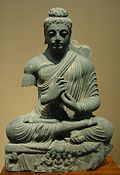
Back পুদ্গলবাদ Bengali/Bangla Pudgalavada German Pudgalavada Spanish Pudgalavaada Estonian Pudgalavādin French Pudgalaváda Hungarian Pudgalavāda ID Pudgalavāda NB Pudgalavada Polish Pudgalavada Portuguese
| Part of a series on |
| Early Buddhism |
|---|
 |
| Part of a series on |
| Buddhist philosophy |
|---|
 |
|
|
The Pudgalavāda (Sanskrit; English: "Personalism"; Pali: Puggalavāda; Chinese: 補特伽羅論者; pinyin: Bǔtèjiāluō Lùnzhě) was a Buddhist philosophical view and also refers to a group of Nikaya Buddhist schools (mainly known as Vātsīputrīyas) that arose from the Sthavira nikāya.[1] The school is believed to have been founded by the elder Vātsīputra in the third century BCE.[1] They were a widely influential school in India and became particularly popular during the reign of emperor Harshavadana (606–647 CE). Harsha's sister Rajyasri was said to have joined the school as a nun.[2] According to Dan Lusthaus, they were "one of the most popular mainstream Buddhist sects in India for more than a thousand years."[3]
- ^ a b Williams, Paul, Buddhism: The early Buddhist schools and doctrinal history ; Theravāda doctrine, Volume 2, Taylor & Francis, 2005, p. 86.
- ^ Dutt, Nalinaksha, Buddhist Sects in India, p. 181.
- ^ William Edelglass (Editor), Jay Garfield (Editor), Buddhist Philosophy: Essential Readings 1st Edition. Oxford University Press, 2009, p. 276.
© MMXXIII Rich X Search. We shall prevail. All rights reserved. Rich X Search